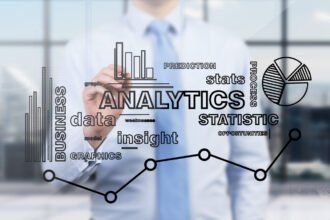The rate of growth at which world economies are growing and developing thanks to new technologies in information data and analysis means that companies are needing to prepare accordingly. As a result of the benefits of business analytics, the demand for Data analysts is growing quickly.
The Bureau of Labor Statistics reports that the role of research and data analysts is projected to grow as much as 23% in the next 8 years. That is a staggering increase in comparison to most other industries. As the world and its technologies changes, so will the needs as dictated by the demands of businesses and their adoption of new technologies and techniques.
With these changes comes the challenge of understanding how to gather, manage, and make sense of the data collected in various markets. With the introduction and use of machine learning, AI tech is enabling greater efficiencies with respect to data and the insights embedded in the information.
With so much of a demand for data analysis and those skilled and experienced enough to effectively make sense of it all that means certain caliber workers are going to be in short supply.
Here is a brief list of suggestions to inform the hiring for that role.
The Role of an Effective Analyst
Data analysts are responsible for the harvesting, management, analysis, and interpretation of big data gathered. They do this to help provide companies with valuable insights into how to make decisions by deciphering trends that emerge from internal and external forces in a company.
Analysts accomplish this through the use of a variety of tools, mostly computer systems aided by AI, to automate that harvesting and interpretation. Data analysts are in demand in nearly every industry nowadays, from sales, marketing, and even healthcare.
As a business, every customer interaction with that service creates markers and patterns that, when combined, tell a story into how that business, its customers, products, and systems work together and affect each other and the health of the organization.
While there are software systems that can do the job of an analyst in part, the insights that a keen and experienced mind can identify suggestions of what to do with the information rather than just seeing a set of data. Before moving into the hiring process though, it would be helpful to narrow down what type of data your business is managing.
Three Different Analysts
Data analysis as a whole is a very broad concept which can and should be broken down into three separate, more specific categories: Data Scientist, Data Engineer, and Data Analyst. Here are the differences, generally speaking.
Data Scientist
These employees are programmers and analysts combined. This type of analyst should have a broad skill set but one that has a grounding in mathematics, analytical skills and is able to combine those into helpful conclusions. Typically, this role will connect with other positions so teamwork and presentation skills would be great things to look for.
Data Engineer
These people specialize in programming. They use a myriad of IT tools to design and build the databases which store and support the analytical solutions while working in cooperation with management in departments that go beyond the IT roles.
Data Analysts
A combination of the last two roles in some ways but with an emphasis on the analysis, synthesis and presentation of the insights gathered from that data collection.
Skills Sets to Look For
When entering into the hiring process for a data analyst there are a few skills that are recommended to look for when narrowing down the pool of options.
- Data modeling will result in how, in part, a business will set standards. Thus, an individual who understands how to present those findings accurately and clearly in actionable ways is important. The ability to artfully represent and explain how the data collected communicates a businesses effectiveness should be a standard skill.
- A data analyst will need to be able to effectively utilize many different systems and software programs in order to gather and analyze that data into meaningful actions. Confidence in those softwares which are industry leading, and standards is key.
- An intermediate understanding of Structured Query Language (SQL), a standard language among database systems like Oracle, Microsoft SQL, and My SQL, is a minimum requirement for data analysts.
While there are many other skill sets that would be helpful and useful in combination, that list should be more tailored to the company, the employees already in service, and the potential holes that need to be filled. Further research will help to formulate a deeper clarification of what and where to find the right person for the job.









